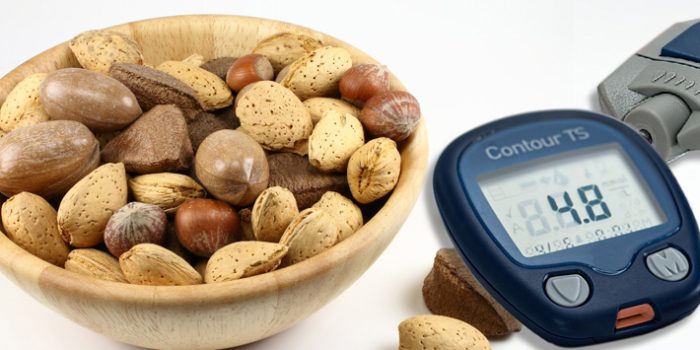Credit Source: Woodenearth
Nut consumption has beneficial effects on glucose and insulin levels, according to the latest researches studying the relationship between the consumption of nuts and Type 2 Diabetes (T2D).
The PREDIMED study has proven that following a Mediterranean diet, with 30 g of nuts a day, reduced the incidence of diabetes by 52% in people with high cardiovascular risk aged between 55 and 80 years, who were non-diabetic when the study began.
Two other researchers following this line have shown that two ounces (57 g) of nuts per day can improve insulin resistance. Researchers from the University of Toronto have performed a meta-analysis of 12 studies into the effects of nuts on health.
They have found that consuming about two ounces of tree nuts per day significantly decreases triglycerides and fasting blood glucose and helps glycemic control in those patients with type 2 diabetes. Indeed, participants showed a mean decrease of glucose of 0.15 mmol/L after eight-weeks of tree nuts’ diets compared with control diets. This analysis also applies to patients with metabolic syndrome, a cluster of risk factors shown to be associated with an increased risk for T2D, cardiovascular disease and mortality.
In addition, researchers at the Human Nutrition Unit, from Rovira i Virgili University, have proven that the intake of two ounces (57 g) of pistachios per day has a significant effect: it decreases fasting glucose, and favors insulin and the homeostasis model assessment of insulin resistance. This line of study has been followed by Dr. S. Gulati, from the Diabetes Foundation in India, who has shown that a diet containing pistachios may improve the cardiometabolic profile of those subjects suffering from metabolic syndrome.
In fact, it has been shown to significantly reduce fasting blood glucose, total cholesterol and LDL cholesterol. Currently, about 400 million people (more than 5% of the population) have T2D.
It is estimated that by 2035 there will be almost 600 million people living with T2D and almost 900 million people with pre-diabetes, a silent state associated with a high risk of several deadly conditions including T2D, heart disease, hypertension, strokes and early death.










